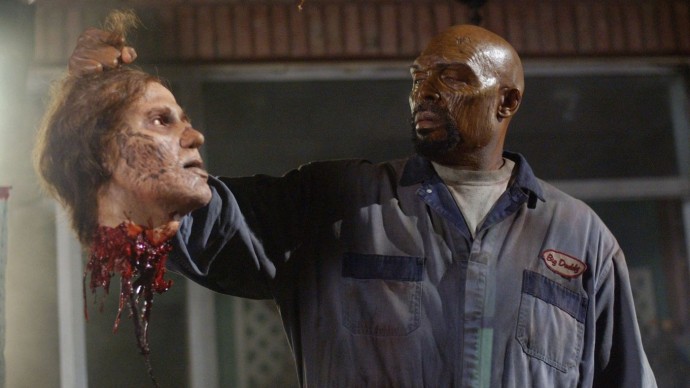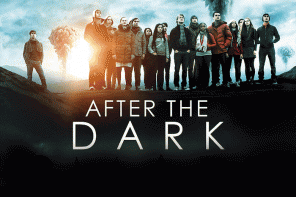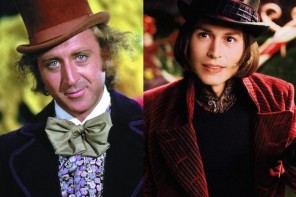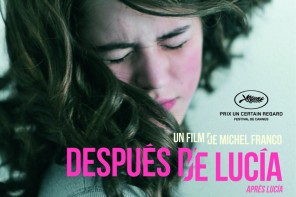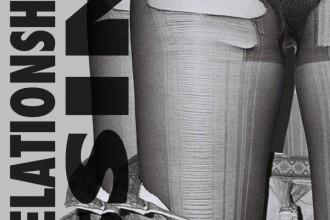Land of the Dead (2005) by George A. Romero
“Zombies of the world, unite!”
Land of the Dead was released in the middle of the summer 2005 as a blockbuster and regarded as such by much of its audience. Most people do not tend to see much more that entertaining, cool, gory movies when dealing with zombie movies. Well, this approach is far from enough when it comes to George Andrew Romero’s films, as his work has always been a fierce satire of contemporary America. In 1968, he tackled the subject of racism with Night of the Living Dead. In Dawn the Dead, its target was America’s consumerism and with Day of the Dead he brought a strong tirade against American militarism under Reagan’s era. Subsequently Land of the Dead can be seen as a lampoon against Bush Junior’s policy.
When the movie starts, the world as we know it has already collapsed. Most of the country is occupied by herds of zombies and outposts have been set up in a few cities. The city of Pittsburgh is ruled by Kaufman (Dennis Hopper), a dictatorial businessman who controls the supplies, entertainment and defense of the city. He and the other rich and powerful of this city live in a gated-community in a highly-protected tower called Fiddler’s Green in which they can enjoy abundant resources of brandy, cigars and good food. Meanwhile, the rest of the survivors live in a slum. In order to prevent them from revolting, Kaufman provides them with “panem et circenses”, bread and circuses. In a way they can be considered as zombies, since most of them do nothing to counter the oppression they endure. These three aeras are well-delimited and their frontiers are heavily guarded, so that the fences that protect the poorest survivors are also those that locks them up. In this film, zombies are the Third World. But this little ecosystem and the unequal treatments that go with it are about to be blown away.
On the one hand, zombies are getting more and more dangerous : they learn ! On the other hand, the assassin Cholo DeMora has betrayed Kaufman and is now threatening the city with the anti-zombie tank-like truck that he stole. The hero of this movie, Riley Denbo (Simon Baker), will try to prevent both enemies from destroying the city.
This film is clearly critical regarding the former Republican administration. Hopper’s character can be seen as a parody of George Bush Jr., with his red tie, his US red flag and quotes such as : “we don’t negotiate with terrorists!” His cruelty clearly emphasizes Romero’s opinion towards this President. Nevertheless, this satire wouldn’t be that efficient if it only consisted in pointing out the character’s stupidity. On the contrary, Romero insists on the negative effect of it.
One of the most noteworthy is the inequality within the town. In addition to showing the dirty slums and the gap between the haves and the have-not, Romero insists on the impossibility for the have-not to jump over this gap. That point illustrates the lack of social mobility of the American society. Cholo DeMora has been a loyal henchman to Kaufman, ready to do all his dirty works. Now, he has enough money and longs for an apartment in Fiddler’s Green. Rather than accepting this rightful demand, Kaufman tries to make Cholo understand that “there is a very long waiting list”, then eventually chooses to have him killed. As the attempt on Cholo’s life fails, Kaufman creates himself some new enemy. Furthermore, the example chosen by Romero does not only illustrate the inequality of American society but the racial grounds on which some of those inequalities rely. The white businessman will eventually call Cholo a “fucking spic bastard”. Kaufman and his associates are all WASPs while his servant is some kind of Uncle Tom caricature. One final example illustrates the xenophobic attitude of the powerful : it is the fence that surrounds the city. With its watchtowers, it can be seen as a reminder of the Mexico-United States Barrier. This barrier is now 1951 miles long (3141 kilometers).
As I already mentioned, racism was the key subject underlying The Night of the Living Dead. Now, Romero’s mastering of the zombie genre allows him to go further than that, as he leans on the way political opponents are treated in this city. Before trying to have him assassinated, Kaufman uses Cholo as a henchman. His assignment consists not only in slaughtering zombies, which he does with extreme pleasure, but also to eliminate protesters from the slum surrounding Fiddler’s Green. What allows me to draw a comparison with Bush’s administration is that the bodies of political opponents are tossed in the same pit as the remains of zombies. I wouldn’t allow Bush’s administration to have committed political assassinations. At least not here. But what I wanted to highlight was that the dangerous creatures wandering for blood and the political opponents are “thrown in the same bag”, so-to-speak. This attitude clearly reminds me of the patriotic pressure and weak-ass rhetorics undergoing at the beginning of the Iraq War. Protesting against this assault has been seen by many as a betrayal : “If you’re not on our side, then you’re on their side!”
As much as George Bush used to, Kaufman clearly draws his power from the fear created by the outside danger. For the President, this danger is terrorism. For the businessman tyrant, it’s the zombie apocalypse. Kaufman uses this threat to establish his authority and get richer. As far as Denbo is concerned, the goal of each raid in zombieland is to provide those who need it with food and medicine. Yet, Cholo is there to get alcohol and cigars, which he will either sell at black market or sell to Kaufman, to get more power. The discrepancy between Denbo’s generous goals and Cholo and Kaufman’s monkey business is also a tirade against the Iraq War. The soldiers were told they would be sent there for Democracy, while the real purpose was Oil.
Romero’s critics are not only addressed to the reasons why this war against zombies is lead, but also about how it is done. As Cholo puts it : “it’s not a battle, it’s a massacre.” His ethics contrast with these of Denbo. To his friend who compliments him about a “nice shoot”, he replies : “Good shoot, Charlie. There’s no such thing as a nice shoot.” Nevertheless, we can see in another scene that zombies are used are practicing targets. On the edges of the city, about twenty zombies are hanged by the feet with round targets stuck to their bodies. Since the zombies are getting more and more self conscious, “learning to be us again” as Denbo puts it, this can be perceived as sheer sadism. Once again this can be related to the Iraq War and to the scandals about torture in Abou-Ghraib. It is from these very massacres and tortures that the consciousness of Big Daddy, the zombie leader rises. At the very beginning of the movie, these zombies are merely wandering in a desert city. Once attacked, Big Daddy leads his herds of zombies towards the city, ready for payback. In a Marxist way, the zombies acquire a “consciousness of class”. They realize they are the oppressed class and decide to unite to overthrow those who brought war upon them.
While the inhabitants of the slums of the city are still pretty much subjugated by the ugly games brought to them by the leading class, the zombie march upon the city. They have broken free from the fascination to the fireworks (“sly flowers”) that was used against them as a distraction so they would become inoffensive easy targets. Instead of searching the sky, they have decided to take hold of their fate.
Warning : spoilers ahead!
One fear of the United States, and the one that justified the attack on Iraq was the existence of Weapons of Mass Destruction in the hands of the enemy. In this film, this WMD is represented by this heavily-armed tank-like truck. Once it is in Cholo’s hands, he directs it at the tower of Fiddler’s Green. The main island of Pittsburgh is very Manhattan-like-shaped and this tower dominating the skyline looks like a reminder of the Twin Towers in Manhattan. Therefore, the attack that is about to happen is pretty much like a remake of 9/11, only this time with WMDs : Romero is picturing a phobia of America. This pending firing seems all the more so as a remembrance of the 9/11 attacks as the weapon is held by Cholo, a rabid dog about to bite his master’s hand. For those who do not remember, Usama Bin Laden was first trained and armed by the CIA in order to fight the Russians in Afghanistan.
Eventually, Cholo does not fire. It is the zombies that put the city ablaze. By doing so, Romero addresses a warning to his fellow compatriots : the real WMDs are nothing but the masses that we pissed off. Once again, the attack comes from the unexpected. The same way as the 9/11 attacks wiped out the certitude that America’s soil was unattainable for its enemies, zombies demonstrate to Kaufman that they can get across the river that surrounds the town. And in a Marxist way, they turn against their oppressors the means of oppression : the zombies learn to use machine-guns and the electrified fences meant to protect the inhabitants turn out to be their very trap.
By way of conclusion, the fear of the zombie in this film can be perceived as terrorism, but the zombie itself is not a terrorist; it’s a revolutionary force, wiping out all kinds of establishment and power. The zombie is the oppressed, not the oppressor; though it is a scary figure. At the very end of the film, the survivors who were rising against Kaufman take hold of the city, planning to build a much different kind of government. Romero declared when releasing the movie : “There is some major shit going on out there. And in a distant way, the zombies represent what we, the global community, should really be thinking about: something like … power to the people.” As for Denbo, he decides to move towards North, away not just from the zombies but from people. While leaving, he talks his driver into not shooting the zombies wandering under a bridge : “They’re just looking for a place to go. Same as us.”

